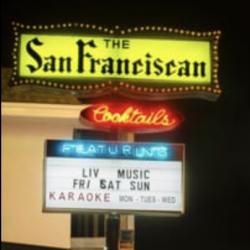Has San Francisco SOULed Out?: Who really is to blame for SF’s Cultural Shift pt 1
It has become grossly apparent that the once, vibrantly raw streets of San Francisco, full of oddballs and eccentrics, is slowly being replaced with a hollow shell of architecture and “economically confident”. But is it all due to the “techies? ” I wonder as they stare aimlessly at their Twitters and Twats, awaiting for their rectangular white chariots to take them to “campus,” where the food is bottomless, where no buttock is left un-heated, and the internet works in every crevice. Yes, every crevice.
Who is to blame?
 For a city that is known of being accepting and innovative, how do we justify the posters going around the mission telling “Brogrammers” to leave San Francisco? Im as upset as anyone that my friends are moving out of the city faster than the Tomale lady’s stash on a Friday at 2am — but this hate messaging has gone too far. Yes, Google and Twitter may pay these well-fed working stiffs enough to afford a significant chunk of their income towards market rate rents, but are they the root of the issue or also victims like us?
For a city that is known of being accepting and innovative, how do we justify the posters going around the mission telling “Brogrammers” to leave San Francisco? Im as upset as anyone that my friends are moving out of the city faster than the Tomale lady’s stash on a Friday at 2am — but this hate messaging has gone too far. Yes, Google and Twitter may pay these well-fed working stiffs enough to afford a significant chunk of their income towards market rate rents, but are they the root of the issue or also victims like us?
What most people fail to realize is that it is the residents and policymakers of SF who support legacy zoning restrictions, block new construction and eviction of residents that may in fact be slowly smothering the city’s soul. Who are these people who aren’t voting? We are. Our voter turn out in the last mayoral election was laughable. We have become our own worst enemy, and we don’t even know it.
A Neighborhood without Neighbors
The same people who are quick to complain about the affordability of the city, are the same ones who will oppose any new construction that may obstruct their view or for the ever-so-ironic fear of changing the “character of the city”. The amount of red tape we’ve erected is being woven in a blanket, suffocating us into a “Hipster-pocalypse” nightmare. How do we solve this? We need to actually vote and stop blaming the symptoms.
After all, what is a neighborhood without your neighbors? San Francisco is a boom town. Always has been. Many of us can trace our history back to one of San Francisco’s peak moments of prosperity. To attack the tech workers arriving in the current boom is to attack our own identity. Tech companies are as much of San Francisco’s identities as gay rights or Bush man. Plus, the tech sector only makes up 8% of the wealth. They are not the enemy, and in fact create 5 non-tech jobs for every 1 tech position.
It’s time we took a step back and educated ourselves as voters about basic economics so that we don’t continue to suffer from the unintended consequences of well meaning but shortsighted policies. Learning about and supporting solutions that both keep us in our homes and accommodate newcomers drawn by the same charm that brought us here, will help keep San Francisco diverse, affordable, and soulful.
The Rent Control Contradiction
I grew up in the old Italian neighborhood of North beach. I think I learned the words“rent control” before I muttered the words “mom.” When I got older and started researching this issue, I was stunned to find out that 93% of economists agree that rent control is a significant contributor to our housing crisis. I always thought that I would not be in San Francisco today, if it were not for rent control and the stability knowing that I could afford my apartment next year, so this shocked me to read.
I always though that all landlords were rich, greedy slumlords who never “wanted” to fix anything. Whereas landlords seem to stereotype us SF renters as squatting complainers. The system, as it is, does seem to breed distrust and contempt. Even right now, there are 36,000 vacant residences in San Francisco that could be homes to people, but because laws are so biased towards renters, landlords have no incentive to rent them out. These same landlords receiving large rent checks monthly have every incentive to prevent new housing since it results in less competition, allowing them to increase rents with each new tenant without earning a greater rent by investing in improving their properties.
Out of all my childhood friends, I’m one of a handful than managed to stay here. In fact, my own mother can not afford to live here anymore. I literally get anxiety at the thought of trying to afford raising a family here. Maybe that’s why San Francisco has more dogs than kids in this city. In fact, we have the lowest number of kids per capita of any city in the United States.
How bad is it?
Francisco, in all its 7 x 7 miles of glory, is the home to a mere 839,336 San Franciscans, yet is the most expensive city in the United States. Right now, there are 372,560 rental units in the city. Out of those, 172,000 are rent controlled.
According to US Census bureau, the median household income in SF in 2013 was $74,922 that is $23,551 greater than the US median household income! Most tech workers are not even that much better off than the median, having arrived in the city in the past decade when rent was already sky high. If you earn under the median income and pay a rent controlled since 1995 $800 month for your one bedroom, you’re economically not much better off than a tech worker earning $101k and paying a 2014 market rate $2250 a month (or 26% of your gross salary) for a 1-bedroom.
The Future of SF Housing
Despite the fact that the cost of living in San Francisco will most likely continue to increase for the foreseeable future, the projections suggest that newcomers will continue to move to San Francisco. Yet, only an average of 1,500 new housing units per year were created over the past decade, despite a population growth of 75,000 people. In the next 25 years, San Francisco is projected to be home to another 150,000 residents and by 2032 we are projected to hit a million people. So I ask you, what kind of people will make up this city if only a specific socio-economic status and demographic can afford to remain here? With an already alarmingly fast rate of rent increases in the city, how can these newcomers hope to afford to live in the city? And what will happen to those who already called SF home? Will we continue to let San Francisco sell our soul to the highest bidder or will we finally put down the misguided picket signs aimed at the tech companies, and start pointing them to the real culprits? Ourselves. Its time to start start voting!
Part 2: “5 Soul-utions to the Housing Crisis”
Statistical data sources:












